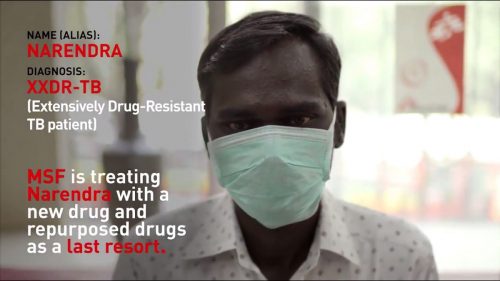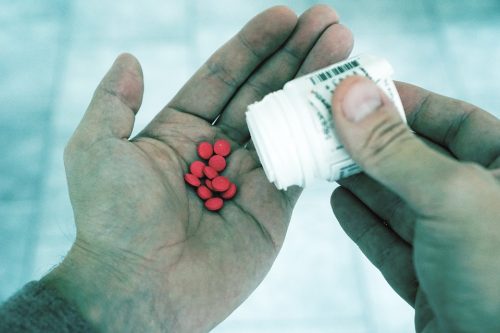TBI Blogs: How One Organisation Is Helping Indians With Extremely Drug-Resistant TB Get the Help They Need
According to WHO’s Global TB report 2015, India has the highest TB burden in the world. For people like Narendra, who develop extremely drug resistant TB, it is vital that new and promising drugs like bedaquiline and delamanid be made easily accessible and affordable.

According to WHO’s Global TB report 2015, India has the highest TB burden in the world. For people like Narendra, who develop extremely drug resistant TB, it is vital that new and promising drugs like bedaquiline and delamanid be made easily accessible and affordable.
Four years ago, Narendra (name changed for anonymity), a worker in a garment factory in Mumbai, noticed that his health was deteriorating. Suffering from frequent fevers, bouts of cough and weakness, Narendra was unable to continue his job. It was not long before he had been diagnosed with tuberculosis (TB).
“I wasn’t able to go anywhere and constantly suffered pain in my legs and feet…I used to feel dizzy while walking,” Narendra remembers. He started a six-month medication course, but it didn’t work for him. “My reports came out back positive, again and again,” he says.
The drugs prescribed to him were not effective. Narendra had developed extremely drug-resistant TB (XXDR-TB), a form of TB that is resistant to the currently available first and second-line TB drugs.

According to WHO’s Global TB report of 2015, India has the highest TB burden in the world. With 2.2 million cases of the global total of 9.6 million cases, India accounts for one-fourth of the total TB incidence worldwide. India is also among the countries worst affected by drug-resistant forms of TB.
Extremely drug-resistant TB is resistant to the most potent TB drugs, and is a nightmare for patients as the treatment brings with it debilitating side effects without the certainty of being cured.
Narendra’s experience was no different.
“During the course of the treatment, I frequently had pain in my legs, itching in my hands, and numbness in my feet; it felt as though they are frozen,” he says. “I was always in pain and found it difficult to control my temper.”
After decades of neglect, many patients like Narendra found a ray of hope in the form of new TB drugs – Bedaquiline and Delamanid – that are the only ones that can fight the deadliest strains of tuberculosis.
However, Delaminid is currently only available in India through a special process, where an application for importing the drug needs to be made on an individual basis. This is a long, and time-demanding procedure that can result in substantial delays in starting the patient’s treatment. Bedaquiline is available under a pilot scheme run by the Indian national TB programme, but only a handful of patients so far have been put on treatment in India.
The international medical humanitarian organization, Doctors Without Borders (MSF) has been treating patients with drug-resistant TB in Mumbai since 2006.

Image for representation only. Source: Pixabay
The organization facilitates accurate and precise diagnosis so that patients are put on treatment adapted to their resistance profile, including bedaquiline and delaminid if needed. MSF also offers psychosocial support that focuses on finding practical solutions to everyday barriers that patients may face in taking their treatment.
“There is a real and urgent need to increase people’s access to these more effective treatments, by making them affordable and available all over India,” says Cristina Falconi, Country Director, MSF India. “These new drugs have the potential to be game changers in the treatment of drug-resistant TB. Our experience from using them is that they are very promising and potentially life-saving for patients with the most extreme drug resistance patterns. At the same time, practitioners must administer them in a correct and responsible manner so that resistance does not develop also to these drugs.”
Today, Narendra is one of the lucky few to have access to the new drugs. In December 2015, MSF started treating him with the new medicines. “Compared to my earlier medication, I feel much, much better now. I feel good at home again and finally, I can work now!” he says, full of hope.
Watch this short video of Narendra’s fight with TB:
To find out more about MSF’s work on tuberculosis in India, click here
Like this story? Or have something to share? Write to us: [email protected], or connect with us onFacebook and Twitter.
NEW: Click here to get positive news on Whatsapp!
If you found our stories insightful, informative, or even just enjoyable, we invite you to consider making a voluntary payment to support the work we do at The Better India. Your contribution helps us continue producing quality content that educates, inspires, and drives positive change.
Choose one of the payment options below for your contribution-
By paying for the stories you value, you directly contribute to sustaining our efforts focused on making a difference in the world. Together, let’s ensure that impactful stories continue to be told and shared, enriching lives and communities alike.
Thank you for your support. Here are some frequently asked questions you might find helpful to know why you are contributing?


This story made me
-
97
-
121
-
89
-
167













